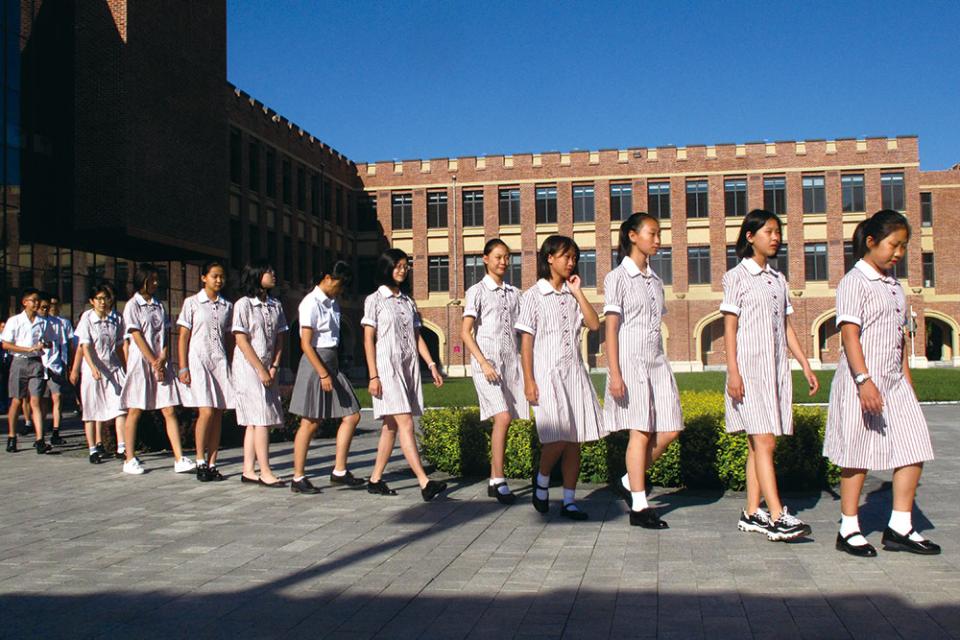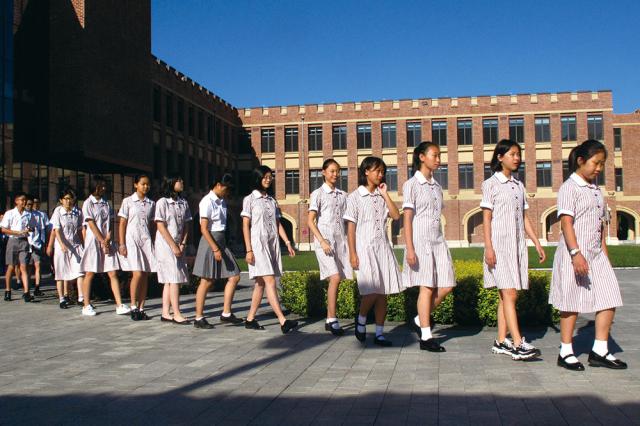Thanks to his talent for music, after graduating from primary school in the Zhongguancun area of Beijing’s Haidian district, Peng Bo, 12, entered the junior high school affiliated to the nearby Beijing Haidian Teachers’ Training College. The school, close to his home and among the capital’s best, made Peng’s mother Yu Jie very satisfied indeed.
Peng Bo, however, was quiet, depressed and told his mother that he was “stifled in the classroom and felt terrible.” Peng loves history and politics and is fond of debating in history classes, regularly raising his hand to ask questions, but the teacher rarely allowed him to actually ask these questions for fear that it would take up too much class time. When his mother Yu Jie heard this, she was deeply affected. This was the trigger that motivated her to go on to send her son to study at a high school overseas.
Motivation
His lack of fear in expressing himself publicly and relatively mature thinking seemed to separate Peng Bo from his peers at school in Beijing. When during a politics class the teacher invited students to discuss China’s One Belt, One Road initiative, his classmates were reluctant to say anything, but Peng was clear and logical in expressing his opinion, leading teacher and classmates alike to gather around him.
Well educated herself, Yu used to work for government agencies and put a lot of emphasis on her son learning English when he was small. She began Peng Bo’s English classes soon after he started elementary school and five years later, Peng began to take one-on-one English classes online with foreign teachers.
In 2013, when Peng finished primary school, Yu took him to the US to visit several well-known universities. Yu was astonished to find that her son had no fear of talking with local professors, asking for directions or going shopping. When one of his own classmates went to Canada for high school, Peng expressed his wish to study overseas.
“Would you be going to escape the gaokao [China’s much-feared college entrance examination]?” asked Yu. “No,” Peng replied. “I just want to learn about what I am really interested in.”
After discussing the current domestic education situation with Peng’s father, a painter, then family finances and their son’s level of English, character and determination, the couple decided to give it a try. “I don’t go with the flow; what’s right for us is the best,” she told NewsChina.
Just as Yu was gearing up to pay for more expensive English courses for her son, writer Lu Yingong was busying working on his novel on “parachute children” – kids who have been dropped into a foreign country on their own. Lu’s fascination with the topic dates back to 2006 when he was a deputy editor at Qianjiang Evening News. For roughly a year, Lu and several other reporters traveled across the US interviewing Chinese students studying at top universities there. Lu found that most of these students had come to the US as high school students.
In the following years, he paid great attention to these parachute children. After checking official statistics, he found that only a very small percentage of students entering the top universities in the US had completed high school in China. It is much easier to enter such universities after attending high school overseas.
In August 2013, when Lu went to Pudong Airport in Shanghai to see off a friend, he noticed many children, with determination in their eyes, were waving goodbye to their parents at the security check. Virtually all the parents’ faces, however, were covered in tears. He said that over the years, he has been overwhelmed by such scenes. That same month, Lu started writing his book about the group. It took less than three weeks to finish the manuscript of A Love For Separation.
Lu periodically interviewed a mother whose son managed average results at a junior high school in China and failed to get into a key senior high school. One year later, the mother sold her apartment and sent her son to study overseas. Her logic was simple - that it is better to invest in the education of her son than keep the apartment for him. The son ended up pursing a PhD at Oxford University.
“Sometimes, children need nothing but encouragement and a push. The disappointing part of studying in China is that an ordinary high school would lead to an ordinary university and, eventually, ordinary employment,” Lu said.
Market
Before Peng’s departure to the US, one of his classmates had already gone to Canada because he did not have a Beijing hukou, the permanent residence permit. That meant he would have been barred from taking the university entrance exam in Beijing, which requires lower marks to get into top schools than if taken elsewhere. Yu estimated that in Beijing, half of students who leave to go to high schools overseas go because of hukou limitations, 30 percent of them took this step after thorough consideration, while the last 20 percent were just following the trend of others.
Yu preferred schools in the eastern US because the region is home to many good universities. The high school admission interview went smoothly. When the interviewer asked Peng whether he could manage studying in the US alone at such an early age, Peng replied that Chinese parents would sacrifice everything for their children and he was willing to leave any comfort zone to develop his independence and ability. Within a week, Peng received the offer. In September, 2015, 14-year-old Peng entered Morris Catholic High School in New Jersey.
Statistics from the Chinese Ministry of Education released in March 2016 showed that the number of Chinese students who study overseas has been on the rise over the last few years, hitting 500,000 in 2015. UNESCO data also showed that the US is the top destination for Chinese students, followed by the UK, Australia and Canada.
According to the Open Doors Report for 2015, released by the Institute of International Education in the US, over 300,000 Chinese students came to the US to study for the academic year of 2014-2015, accounting for 31.2 percent of international students. Statistics from the agency also indicated that over the past 10 years, the number of students pursuing high school education in the US has increased rapidly. In 2015, over 40,000 children from China were parachuted into the US, up from 433 in 2004.
In Canada, the growth rate of parachute children arrivals is below that of the US, but the number has been rising rapidly over the years. Lin Xiaobin, an employee of an overseas study agency is responsible for caring for more than 60 Chinese high school students in the Saanich School District of British Columbia, Canada. She told our reporter that when she started the job several years ago, there were only 13 minors in the school district, but now, hundreds arrive each year.
She maintains that the main reason for the increasing number of parachute kids is because of gaokao pressures in China. In Canada, she said, students do not need to sit a college entrance exam and face much less pressure. She added that high school students in Canada attend classes from 8.30 am to 3 pm and have much more time to participate in sports.
Lin has to help the students with issues such as how to top up their phones, how to log onto the Internet and even where to find socks. “High school students are young and they need to be taken care of in many aspects, particularly at a time when their spoken English is not that good, shortly after arrival,” she said.
Concerns
Within six months of the publication of Lu Yingong’s novel A Love For Separation, at least six film production companies expressed an interest in adapting it for the screen. He attributed the popularity to the “common desire of Chinese parents to break free of the shackles of the domestic education system.”
He said that parents nowadays are far different from the previous generations, are better educated and hope their offspring can study and mature in a relaxed and supportive environment, which, within the current domestic education system, is virtually impossible.
“[Sending minors to study overseas] is not necessarily an approval of overseas education, but it does show dissatisfaction of domestic education,” Lu told NewsChina. “Apart from education, air and food safety [concerns] and the lack of a stable environment for speaking the truth in class are also concerns for Chinese parents.”
Li Lu, a children’s writer, remains hesitant on whether to send her daughter, currently in the third year of junior high school, to study overseas next year. Among the 1,200 students of the same grade, her daughter ranked 21st in a recent test and is highly likely to be admitted to Hengshui High School in Hebei Province, one of the best-regarded high schools nationwide.
Li found, however, that her daughter’s enthusiasm to study has been dwindling recently, particularly in literature and art, because she had to spend too much time on rote learning at the weekend.
“The gaokao is the country’s single selection method, and has serious regional inequality,” she said. “Students in China have to devote nearly all their efforts and time to enhance their exam skills to improve their grades,” she continued.
Since August 2016 when the TV series of A Love For Separation was aired, many parents asked Lu via his Weibo account, China’s Twitter-like social media platform, whether it does more harm than good for minors to study overseas. Lu said it is not easy to give a one-size-fits-all answer and that it depends on the child’s independence and grasp of language as well as the financial situation of the family.

 Old Version
Old Version
